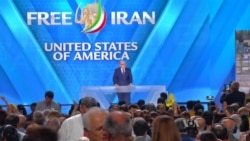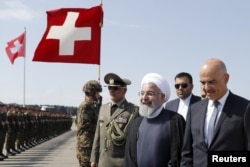The United States has announced plans to reimpose tough sanctions on Iran's energy and banking sectors, saying the Iranian government needs to change its behavior and act like a "normal country."
"Our goal is to increase pressure on the Iranian regime by reducing to zero its revenue on crude oil sales," said Director of Policy Planning Brian Hook. "We are working to minimize disruptions to the global market, but we are confident there is sufficient global spare oil capacity."
During Monday's press briefing at the State Department, Hook called on Iran to meet demands in order to deem it a "normal country."
WATCH: US, Iran sanctions
"Normal countries don't terrorize other nations, proliferate missiles, and impoverish their own people," Hook said. "As Secretary [of State Mike] Pompeo has said, this new strategy is not about changing the regime, it is about changing the behavior of the leadership in Iran to comport with what the Iranian people really want them to do."
The State Department's director of policy planning noted the first part of U.S. sanctions will snap back in August 6. These sanctions will include targeting Iran's automotive sector, trade and gold, and other key metals. He said the remaining U.S. sanctions will snap back in November 4. These sanctions will include targeting Iran's energy sector and petroleum-related transactions, and transactions with the central bank of Iran.
U.S. President Donald Trump pulled the U.S. out of the Iran nuclear agreement in May, and has warned other countries that they will also face sanctions if they continue to trade with sanctioned sectors of the Iranian economy. All the other parties to the nuclear deal — the European Union, Britain, France, Russia, China and Germany — say they remain committed to the agreement and have expressed strong disappointment at Washington's withdrawal. Hook said State Department and Treasury officials are traveling around the world meeting with U.S. allies to try to persuade them to cooperate with the sanctions.
Iranian President Hassan Rouhani is traveling to Switzerland and Austria this week on a diplomatic tour of his own to try to preserve the Iran nuclear deal after the U.S. withdrawal. He said he expects European countries to unveil a package of measures in the coming days designed to keep the deal alive.
Rouhani's trip comes amid ongoing street protests in Iran due to deteriorating economic conditions. Demonstrators protesting drinking water shortages in southwestern Iran clashed with police for a second night Sunday.







